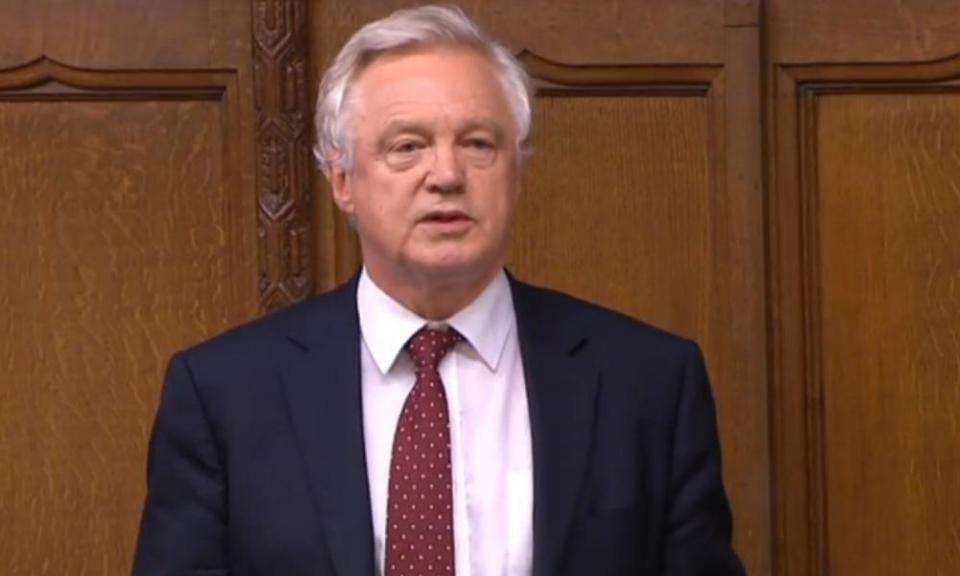May hangs on as Johnson condemns Brexit plan in speech
Boris Johnson has used a stinging resignation speech to tell MPs it is “not too late to save Brexit”, but stopped short of a leadership challenge against Theresa May.
The former foreign secretary, who resigned from the cabinet last week over May’s Chequers negotiating strategy, said the government had allowed a “fog of uncertainty” to descend since May’s Lancaster House speech in January 2017, which suggested a “comprehensive, bold and ambitious free trade agreement” with the EU27.
Later on Wednesday, May warned a meeting of her backbench MPs of the risks of a general election. Senior Conservatives said afterwards that she had weathered a febrile few days at Westminster and would survive to resume battle with Brexit hardliners after the summer recess.
A sombre Johnson told the House of Commons: “It is not too late to save Brexit. We have time in these negotiations. We have changed tack once and we can change again. The problem is not that we failed to make the case for a free trade agreement of the kind spelt out at Lancaster House – we haven’t even tried.”
He appeared to lash out at fellow Brexiters, including his old rival Michael Gove, who had opted to stay inside the cabinet, believing they can fight for changes to the deal later.
“It is absolute nonsense to imagine, as I fear some of my colleagues do, that we can somehow afford to make a botched treaty now and then break and reset the bone later on,” said Johnson. “Because we have seen even in these talks how the supposedly provisional becomes eternal.”
Johnson did not call for May to step aside, nor urge his supporters to submit letters to Graham Brady, chair of the 1922 Committee, 48 of which would trigger a vote of no confidence and potentially a leadership challenge.
But much of his speech was devoted to criticising the negotiating strategy that has been personally overseen by May. Jacob Rees-Mogg, chair of the pro-Brexit European Research Group of MPs, later described the speech as “statesmanlike”.
Johnson’s departure – along with those of the former Brexit secretary David Davis, the former Brexit minister Steve Baker and a handful of more junior government figures – has underlined the deep divisions in the Conservative party, and the conundrum facing May as she tries to negotiate a deal that will satisfy parliament.
Both Davis and Baker flexed their muscles in the Commons on Wednesday, with the former Brexit secretary calling on the prime minister to publish a paper he commissioned about past EU agreements.
Baker warned May that she would not be able to avoid confronting the sceptics in her own party, claiming he and his colleagues could rely on many more than 40 votes to reject the Chequers approach.
“Whether people like it or not, however impartial they may be, they must bring forward a deal which can be voted through by the Conservative party,” he said.
“The number 40 [of hard Brexiters] has been bandied around in this house in the last few days, and I’m sorry to say, and it gives me no pleasure to say it, but the thing I have to say is: and the rest. People who have said the number 40 are not out by a fraction when they come to consider the number of members who don’t like this deal on these benches and are willing to vote in line with this dislike. They are out by a factor, not a fraction.”

May caved in to amendments on her customs bill tabled to scupper the Chequers deal this week rather than confront the Brexit rebels directly. She avoided defeat by the other wing of her party on Tuesday night only with the backing of four pro-leave Labour MPs.
Johnson was particularly critical of May’s plan for a “facilitated customs arrangement,” describing it as “a fantastical, Heath Robinson customs arrangement”.
He listed a series of compromises he said had been made since Lancaster House, including the £40bn payment agreed as part of the withdrawal agreement, the continued oversight of the European court of justice over some issues, and the “common rulebook” for key industries.
“Far from making laws in Westminster, there are large sectors in which ministers will have no power to initiate, innovate or even deviate,” he said, describing the Chequers approach as “volunteering for economic vassalage”.
MPs on the 1922 Committee gave May a warm reception, according to sources. One cabinet minister said afterwards: “Whatever the differences are, we hang together and support the prime minister.”
A second cabinet minister, who predicted that the PM would now survive, added: “Everybody was positive, including people who haven’t been in the last couple of weeks. It was quite surprising.”
However, several MPs, including Andrew Percy and Paul Scully, raised concerns about how they would be able to sell the Chequers agreement to their members, sources said.
One Brexiter MP said: “Lots of people said they were putting in letters, but it was all puff. That’s not what Jacob [Rees-Mogg] wanted. There’s nothing like a close vote to clear the mind.”
The prime minister told MPs to remember all their other achievements, even if quite small, over the last year rather than just focusing on Brexit.
Meanwhile it has emerged that the government still has no business plan if post offices are forced to issue up to seven million international driving permits in a single year in the event of a no-deal Brexit. At present, 89 post offices issue 100,000 international driving permits a year.
A National Audit Office report examining the Department for Transport readiness for leaving the EU has also expressed concern that plans to manage traffic flow at Dover without a deal are behind schedule.

 Yahoo News
Yahoo News 
